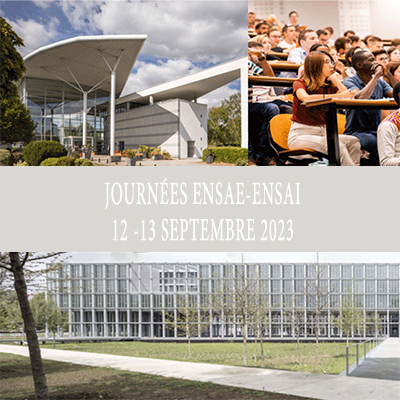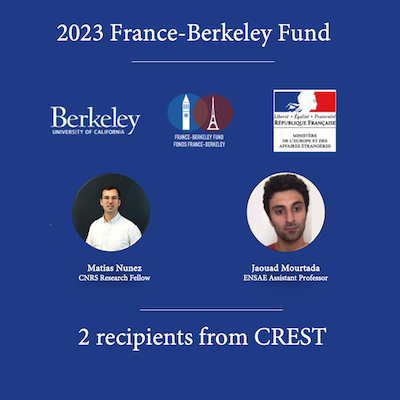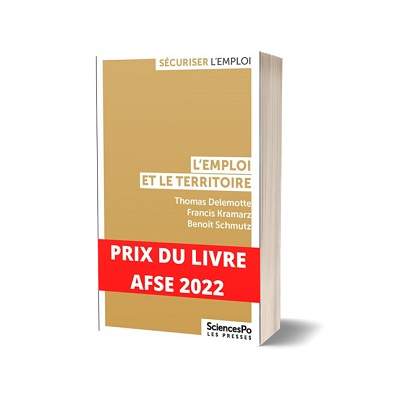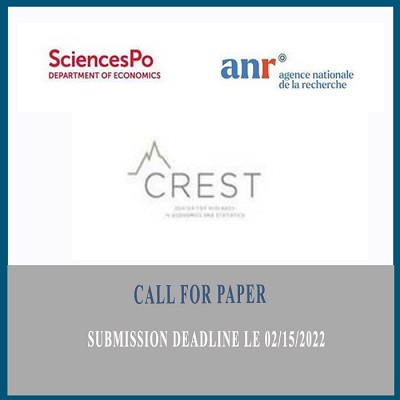On September 12 and 13, statisticians from both campuses of CREST (Bruz, ENSAI and Palaiseau, ENSAE) as well as statisticians from INSEE gathered for the Statistical workshop ENSAE-ENSAI at Palaiseau to present their current work. The event was organized by Victor-Emmanuel Brunel, Professor in Statistics ENSAE/CREST and Adrien Saumard, Associate Professor in Statistics ENSAI/CREST.
The primary objective of these meetings between statisticians from ENSAE and ENSAI, as well as statisticians from INSEE, is to enhance exchanges and foster collaborations between the two CREST campuses and INSEE. The event featured participants delivering 30-minute presentations.
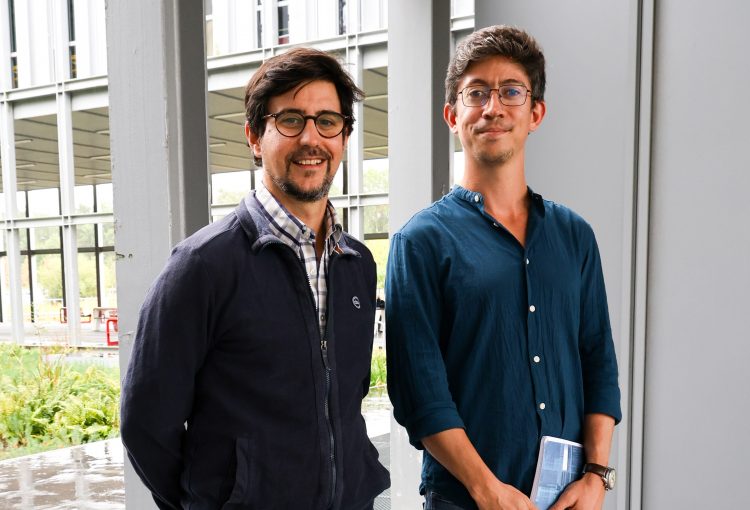
Statistical insights from the CREST workshop
On the first day of the workshop, a diverse range of topics in statistics was explored through a series of presentations. Researchers delved into intriguing subjects such as preemption and learning in stochastic scheduling, determinantal sampling designs, and the theoretical perspective and practical solutions related to kernel Stein discrepancy thinning. The day also featured discussions on dynamic modeling of abundance data in ecology, non-parametric intensity estimation of spatial point processes employing random forests, and the complexities of repeated bidding with dynamic value. Additionally, topics like adaptive functional principal components analysis, learning patterns within multivariate functional data, and the concentration of empirical barycenters in non-positively curved metric spaces contributed to a rich and stimulating day of statistical exploration and research.
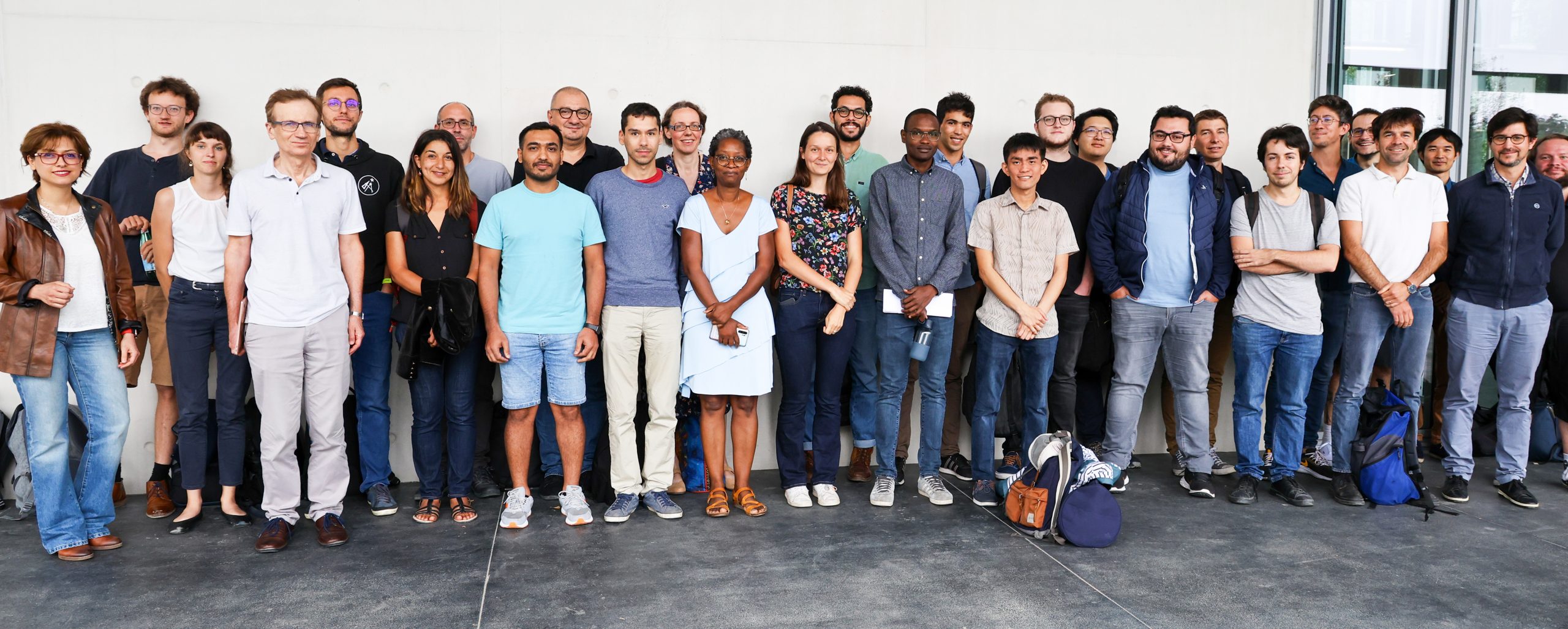
The second day of the workshop continued to offer a diverse array of statistical topics and insights. Researchers engaged in discussions about scalable and hyper-parameter-free covariate shift adaptation through a conditional sampling approach, contributing to the field’s adaptability and scalability. Another session explored risk-aware bandits with implications for improving crop management practices, bridging statistical methods with real-world applications. The day also delved into “Topics on methodology for official statistics,” providing valuable insights into the methodological considerations for producing authoritative statistical information. In addition, there were discussions on “Learning the smoothness of weakly dependent functional time series,” a crucial topic in understanding data patterns. Lastly, the finite-sample performance of the maximum likelihood estimator in logistic regression was explored, shedding light on the practical applications of statistical techniques in this context. The second day continued to enrich the workshop with a broad spectrum of statistical research and its real-world implications.
CREST: a collaboration between Bruz (ENSAI) and Palaiseau (ENSAE Paris) campuses
The recent statistics workshop held at ENSAE Paris exemplified the collaborative spirit between our campuses in Bruz at ENSAI and Palaiseau. This event provided researchers from both locations with a unique opportunity to connect, share ideas, and contribute to the advancement of statistical research. It underscored the enduring commitment to knowledge exchange and academic synergy that characterizes the partnership between our two campuses.
Welcoming New Minds to CREST: A Brief Introduction to Our Researchers
The CREST laboratory is excited to introduce its newest members, whose diverse expertise promises to contribute significantly to our ongoing research endeavors. Hailing from various fields, each researcher brings a unique perspective and valuable insights that will undoubtedly enrich the lab’s intellectual environment.
Statistics |
Sociology |
Finance |
|||
 |
 |
 |
 |
 |
 |
| Austin Stromme | Frédéric Lavancier | Guillaume Maillard | Lea Pessin | Olivier Lopez | Olivier David Zerbib |
| Austin Stromme, a 5th-year Ph.D. student in the EECS Department at MIT, comes with a strong academic background. Under the guidance of Philippe Rigollet and Guy Bresler, his focus lies in geometric problems related to statistics and optimization. Having graduated with a double major in mathematics and computer science from the University of Washington in 2018, Austin is poised to make meaningful contributions to the lab’s statistical research. | Hailing from France, Frédéric Lavancier is a distinguished statistician renowned for his contributions to statistical theory and methodology. With expertise in spatial statistics and stochastic processes, his research extends across diverse statistical domains. Holding leadership positions at GENES and CAPESA, Frédéric’s presence in CREST augments the lab’s statistical prowess. | Guillaume Maillard, a postdoctoral researcher at the University of Luxembourg, focuses on mathematical statistics. His work encompasses robust non-parametric estimation, model selection, and aggregation, with particular emphasis on cross-validation and hold-out aggregation. Guillaume’s expertise adds depth to CREST’s statistical research capabilities.
|
Assistant Professor of Sociology and Demography, Léa Pessin, brings a wealth of experience. Holding a Ph.D. from Pompeu Fabra University, her research delves into the gender revolution’s implications on women’s work and family outcomes. Utilizing quantitative methods on cross-national and longitudinal data, Léa’s work contributes to a deeper understanding of societal dynamics. | Olivier Lopez, a professor of applied mathematics (statistics) at Sorbonne University, specializes in actuarial science and statistical modeling. With a keen focus on emerging risks in insurance, Olivier’s research addresses cyber-risks, duration models, copula models, and high-dimensional problems. His association with AXA Research Fund underscores his commitment to cutting-edge research. | As an Associate Professor of Finance, Olivier David Zerbib’s research spans sustainable finance and asset pricing. Having previously worked at EDHEC Business School and Boston University, his expertise enhances CREST’s financial research initiatives. His focus on sustainable and environmental finance aligns with today’s evolving financial landscape.
|
Economics |
Computer science |
|||
 |
 |
 |
 |
 |
| Sara Signorelli | Bertrand Garbinti | Suzanne Bellue | Marion Leroutier | Cédric Herzet |
| Dr. Sara Signorelli, an Assistant Professor of Microeconomics at the University of Amsterdam, is a rising star in labor economics, public economics, migration, and innovation. Her association with esteemed institutions like Paris School of Economics and University of Amsterdam enriches CREST’s economic research portfolio. | Senior Researcher at CREST-ENSAE-Institut Polytechnique Paris, Bertrand Garbinti’s research explores economics of inequality, taxation, public economics, and family dynamics. His association with Banque de France and other reputable institutions underscores his influence in the economic research landscape.
|
Suzanne Bellue, a Ph.D. candidate in economics from Mannheim University, contributes a fresh perspective to macroeconomics, public, labor, and development economics. Her potential to shed light on these crucial economic domains resonates with CREST’s commitment to comprehensive economic research.
|
Applied environmental economist Marion Leroutier’s work on air pollution and climate change adds a vital dimension to CREST’s research. Her accolades include the 2022 Best Doctoral Dissertation Award from the European Association of Environmental and Resource Economists. Her upcoming tenure-track position at ENSAE and CREST signifies her future contributions to the field. | With a Ph.D. in Applied Sciences from Université catholique de Louvain, Cédric Herzet’s expertise in machine learning, inverse problems, and model-order reduction is invaluable. His research in efficient reconstruction methods showcases his commitment to pushing the boundaries of computer science. |
The addition of these brilliant minds to CREST underscores the lab’s commitment to fostering interdisciplinary research and driving innovation across various fields. Their collective expertise promises to chart new frontiers in their respective domains, enriching CREST’s legacy of excellence.
2023 France-Berkeley Fund: 2 recipients from the CREST

The France-Berkeley Fund
Established in 1993 as a partnership with the French Ministry of Foreign Affairs, the France-Berkeley Fund (FBF) promotes and supports scholarly exchange in all disciplines between faculty and research scientists at the University of California and their counterparts in France.
Through its annual grant competition, the FBF provides seed money for innovative, bi-national collaborations. The Fund’s core mission is to advance research of the highest caliber, to foster interdisciplinary inquiry, to encourage new partnerships, and to promote lasting institutional and intellectual cooperation between France and the United States.
2023-2024 Call: 2 CREST recipients
For the 2023-2024 call, 2 projects have been submitted and are getting funded:
• Decentralizing divorces
A project developed by Matias Nunez (CREST, CNRS Research fellow) and his counterpart Federico Echenique, Professor of Economics and Social Sciences at UC Berkeley.
Abstract:
This project focuses on the development of practical applications of mechanism design, a branch of economics concerned with developing well-functioning institutions that ensure efficient and fair outcomes. In particular, we will focus on legal settings where two persons need to reach an agreement while their preferences are misaligned. Examples are dissolution of partnerships, allocation of rights and duties among conflicting agents, and divorces. While a judge, legal experts and lengthy bargaining procedures are often needed in practice, we plan to develop economic tools to appraise reasonable compromises, reducing both cost and time.
• Towards Local, Distribution-Free and Efficient Guarantees in Aggregation and Statistical Learning
A project developed by Jaouad Mourtada (CREST, ENSAE Paris) and his counterpart Nikita Zhivotovskiy, Assistant Professor in Statistics at UC Berkeley.
Description:
Statistical learning theory is dedicated to the analysis of procedures for learning based on data. The general aim is to understand what guarantees on the prediction accuracy can be obtained, under which conditions and by which procedures. It can inform the design of sound and robust methods, that can withstand corruption in the data or departure from an idealized posited model, without sacrificing accuracy or efficiency in more favorable situations. In particular, the problem of aggregation can be formulated as follows: given a class of predictors and a sample, form a new predictor that is guaranteed to have an accuracy approaching that of the best predictor within the class, up to an error that should be as small as possible.
This problem can be cast in several settings and has been investigated through various angles in Statistics and Computer Science. While the topic is classical, it has seen a renewed interest through (for instance) the recent direction of robust statistical learning, which raises the question of the most general conditions under which a good accuracy can be achieved. Despite important progress, several important and basic questions have remained unanswered in the literature, which we aim to study.
2023 France-Berkeley Fund: 2 CREST recipients

The France-Berkeley Fund
Established in 1993 as a partnership with the French Ministry of Foreign Affairs, the France-Berkeley Fund (FBF) promotes and supports scholarly exchange in all disciplines between faculty and research scientists at the University of California and their counterparts in France.
Through its annual grant competition, the FBF provides seed money for innovative, bi-national collaborations. The Fund’s core mission is to advance research of the highest caliber, to foster interdisciplinary inquiry, to encourage new partnerships, and to promote lasting institutional and intellectual cooperation between France and the United States.
2023-2024 Call: 2 CREST recipients
For the 2023-2024 call, 2 projects have been submitted and are getting funded:
• Decentralizing divorces
A project developed by Matias Nunez (CREST, CNRS Research fellow) and his counterpart Federico Echenique, Professor of Economics and Social Sciences at UC Berkeley.
Abstract:
This project focuses on the development of practical applications of mechanism design, a branch of economics concerned with developing well-functioning institutions that ensure efficient and fair outcomes. In particular, we will focus on legal settings where two persons need to reach an agreement while their preferences are misaligned. Examples are dissolution of partnerships, allocation of rights and duties among conflicting agents, and divorces. While a judge, legal experts and lengthy bargaining procedures are often needed in practice, we plan to develop economic tools to appraise reasonable compromises, reducing both cost and time.
• Towards Local, Distribution-Free and Efficient Guarantees in Aggregation and Statistical Learning
A project developed by Jaouad Mourtada (CREST, ENSAE Paris) and his counterpart Nikita Zhivotovskiy, Assistant Professor in Statistics at UC Berkeley.
Description:
Statistical learning theory is dedicated to the analysis of procedures for learning based on data. The general aim is to understand what guarantees on the prediction accuracy can be obtained, under which conditions and by which procedures. It can inform the design of sound and robust methods, that can withstand corruption in the data or departure from an idealized posited model, without sacrificing accuracy or efficiency in more favorable situations. In particular, the problem of aggregation can be formulated as follows: given a class of predictors and a sample, form a new predictor that is guaranteed to have an accuracy approaching that of the best predictor within the class, up to an error that should be as small as possible.
This problem can be cast in several settings and has been investigated through various angles in Statistics and Computer Science. While the topic is classical, it has seen a renewed interest through (for instance) the recent direction of robust statistical learning, which raises the question of the most general conditions under which a good accuracy can be achieved. Despite important progress, several important and basic questions have remained unanswered in the literature, which we aim to study.
Roland Rathelot, professor at ENSAE Paris and researcher at CREST, winner of an ERC-Consolidator 2022 grant
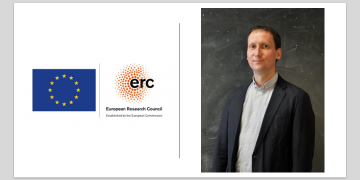
Roland Rathelot, professor at ENSAE Paris and at the Institut Polytechnique de Paris, researcher at the Centre de Recherche en Économie et STatistique (CREST) and Hi! PARIS joins the list of the already 3 scientific talents of CREST to obtain an ERC grant. His research focuses on the job search process, discrimination by ethnic origin and gender differences in the labor market.
Thanks to his ERC Consolidator grant, Roland Rathelot will work on the INASHI project in which he will study the nature of informational frictions that employers encounter during the recruitment process.
Many countries have both high unemployment rates and unfilled vacancies. Informational frictions are one possible source of this dual problem. On the one hand, job seekers may lack information about how the labor market works or how their skills are assessed. On the other hand, employers may find it difficult to assess the profile of applicants. The INASHI project focuses on this second hypothesis and aims to quantify and qualify the information deficits that employers encounter when they decide to post a job offer, or when they evaluate the applications received.
INASHI also aims to measure the macroeconomic consequences of these informam frictions and to propose solutions. Roland Rathelot and his co-authors will combine the use of administrative date sources and randomized experiments in three European countries: Austria, France and Sweden.
Workshop on Political Economy
CREST – Ecole Polytechnique, IP Paris
March 24, 2022
Workshop on Political Economy
Organizers: Pierre Boyer, Alessandro Riboni, Germain Gauthier and Héloïse Clolery
Address: CREST 5, avenue Henry Le Chatelier 91120 Palaiseau
Room 3001
12:00 – 13:30: Welcome lunch
13:30-14:00: Allan Drazen (University of Maryland) “Voting with Your Brain, Your Gut, … or Simply Holding Your Nose?”
14:00-14:30: Benoit Schmutz (CREST) “Mobilization without Consolidation: Social Media and the Yellow Vests Protests”
14:30-15:00: Alessandro Riboni (CREST) “Sticky Spending, Sequestration and Government Debt”
15:00-15:30: coffee break
15:30-16:00: Héloïse Clolery (CREST) “Legislators in the Crossfire: Strategic Non-Voting and the Effect of Transparency”
16:00-16:30: Germain Gauthier (CREST) “Sex Crimes and the Me Too Movement”
16:30-17:00: coffee break
17:00-17:30: Oliver Vanden Eynde (PSE) “Bidding for roads”
17:30-18:00: Thierry Verdier (PSE) “Culture, Institutions and the Long Divergence”
End of the Workshop
“L’emploi et le territoire” a reçu le Prix AFSE 2022 du meilleur livre économique dans la catégorie poche
Félicitations à Francis Kramarz, Benoît Schmutz et Thomas Delemotte co-auteurs du livre “L’emploi et le territoire” édité aux Presses de Sciences Po. L’ouvrage a reçu le Prix AFSE 2022 du meilleur livre économique à destination des étudiants dans la catégorie poche.
Auteurs :
- – Francis Kramarz, Professeur d’économie associé à l’ENSAE et à l’École Polytechnique, chercheur affilié au CREST et à l’Institut des Politiques Publiques (IPP)
- – Benoît Schmutz, Professeur d’économie à l’École Polytechnique, chercheur affilié au CREST et à l’Institut des Politiques Publiques (IPP)
- – Thomas Delemotte, Doctorant en économie au CREST, affilié à l’Institut des Politiques Publiques (IPP)
Résumé :
Même s’ils sont parfois très proches de régions dynamiques, certains territoires subissent des taux de chômage élevés et ne parviennent pas à moderniser leur appareil productif. Comment expliquer une telle fragmentation spatiale ?
L’analyse économique montre, d’un côté, que les ménages sont fortement attachés à leur lieu de résidence et peu au fait des opportunités économiques existant ailleurs ; de l’autre, que les entreprises peinent à recruter lorsqu’elles investissent dans les zones délaissées. De nombreuses initiatives sont prises par les acteurs publics locaux et nationaux pour tenter de rapprocher travailleurs et emplois. Cependant, qu’il s’agisse de rendre les territoires plus attractifs ou d’aider à la mobilité résidentielle des ménages, force est de constater que ces politiques sont souvent peu efficaces. Et si, face à ce bilan globalement négatif, la solution consistait à agir sur l’offre immobilière ?
“L’emploi et le territoire” – Les Presses Sciences Po :
http://www.pressesdesciencespo.fr/fr/book/?gcoi=27246100751580#h2tabtableContents
Replay de la présentation de l’ouvrage par les auteurs à l’Institut Louis Bachelier :
- E-Matinale ILB – 2 juin 2021
On en parle dans la presse :
- La Librairie de l’Éco – BFM Buisiness – Mai 2021
Job openings 2022 at CREST
Find out the latest Assistant, Associate and Full Professor positions offers at CREST
Call for paper: Conference on “Individual Risks and the Macroeconomy”
Submission deadline: February 15th, 2022
Discover the three 2021-22 CREST Job Market Candidates
Discover the three 2021-22 CREST Job Market Candidates in Economics:

